Wider Professional Practice and Development in Education & Training
VerifiedAdded on 2023/06/08
|17
|5607
|354
Report
AI Summary
This report provides an overview of wider professional practice and development in education and training, focusing on the concept of professionalism, the influence of social, political, and economic factors on education policy, and the impact of current educational policies on curriculum and practice. It also justifies key aspects of organizational policies, codes of practice, and guidelines, analyzing the impact of organizational requirements on curriculum practice. Furthermore, the report explains the roles of stakeholders and external bodies in education and training, emphasizing the importance of working in partnership with employers. It examines quality improvement and assurance arrangements, explains the function of self-assessment and evaluation, and evaluates a learning program while identifying areas for improvement, taking into account the outcomes of the evaluation.
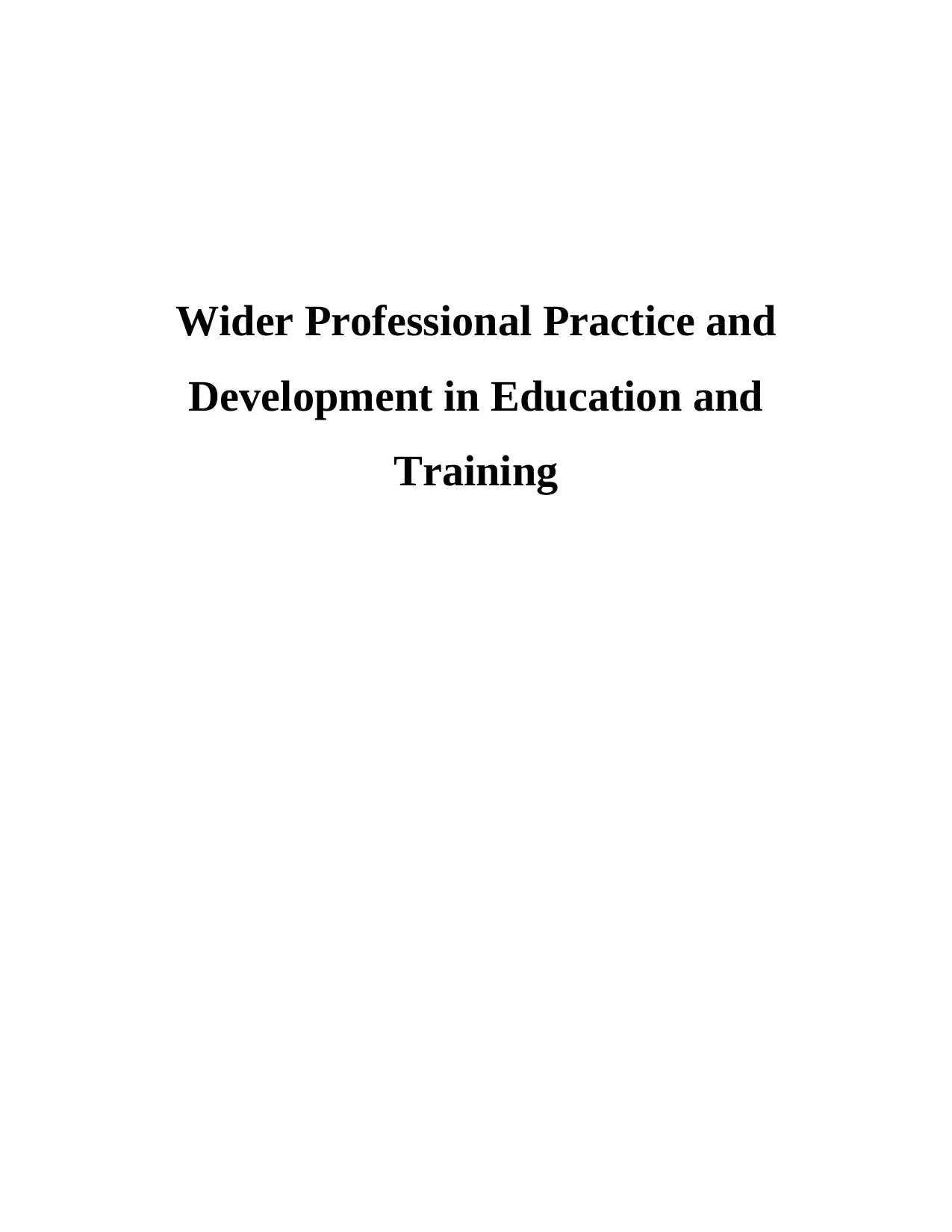
Wider Professional Practice and
Development in Education and
Training
Development in Education and
Training
Paraphrase This Document
Need a fresh take? Get an instant paraphrase of this document with our AI Paraphraser
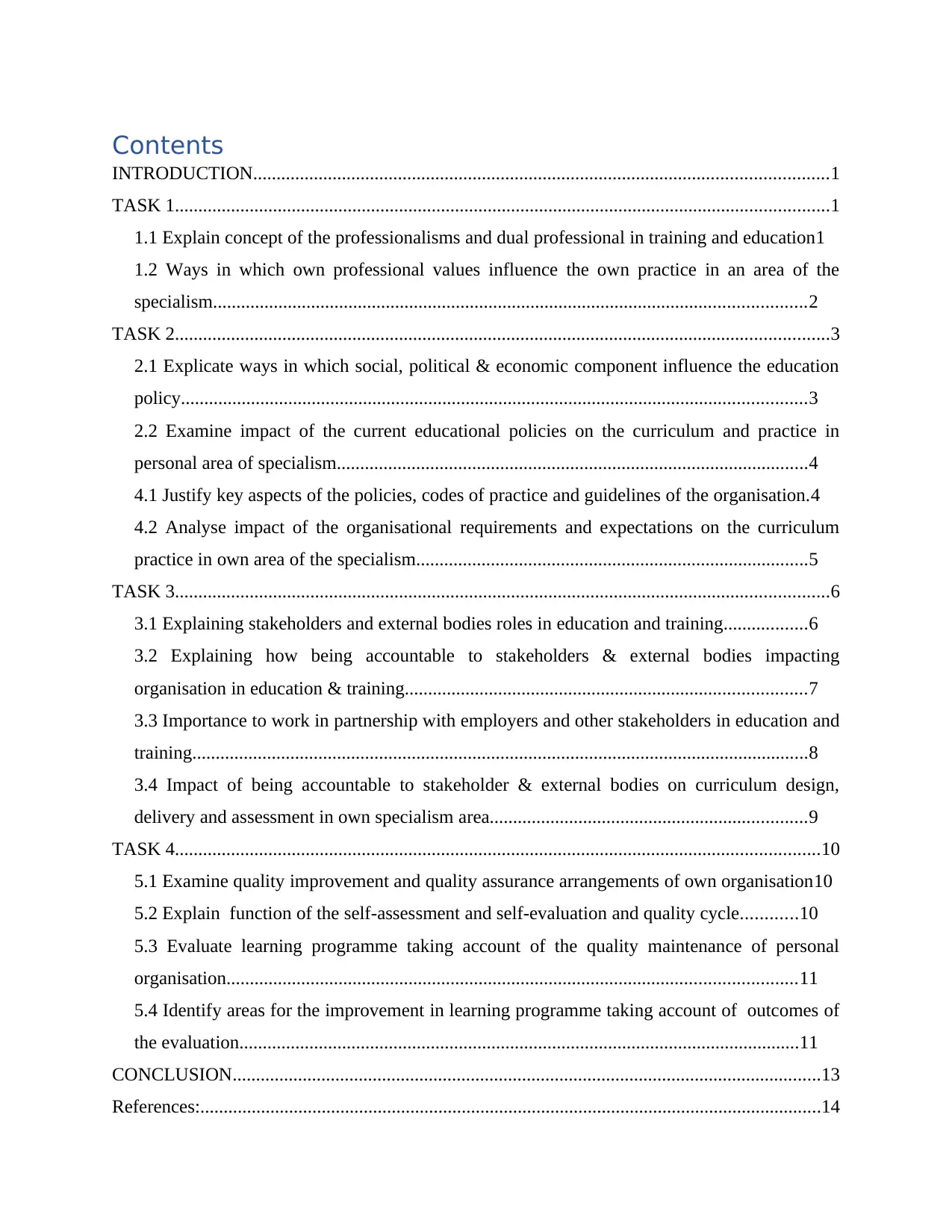
Contents
INTRODUCTION...........................................................................................................................1
TASK 1............................................................................................................................................1
1.1 Explain concept of the professionalisms and dual professional in training and education1
1.2 Ways in which own professional values influence the own practice in an area of the
specialism...............................................................................................................................2
TASK 2............................................................................................................................................3
2.1 Explicate ways in which social, political & economic component influence the education
policy......................................................................................................................................3
2.2 Examine impact of the current educational policies on the curriculum and practice in
personal area of specialism.....................................................................................................4
4.1 Justify key aspects of the policies, codes of practice and guidelines of the organisation.4
4.2 Analyse impact of the organisational requirements and expectations on the curriculum
practice in own area of the specialism....................................................................................5
TASK 3............................................................................................................................................6
3.1 Explaining stakeholders and external bodies roles in education and training..................6
3.2 Explaining how being accountable to stakeholders & external bodies impacting
organisation in education & training......................................................................................7
3.3 Importance to work in partnership with employers and other stakeholders in education and
training....................................................................................................................................8
3.4 Impact of being accountable to stakeholder & external bodies on curriculum design,
delivery and assessment in own specialism area....................................................................9
TASK 4..........................................................................................................................................10
5.1 Examine quality improvement and quality assurance arrangements of own organisation10
5.2 Explain function of the self-assessment and self-evaluation and quality cycle............10
5.3 Evaluate learning programme taking account of the quality maintenance of personal
organisation..........................................................................................................................11
5.4 Identify areas for the improvement in learning programme taking account of outcomes of
the evaluation........................................................................................................................11
CONCLUSION..............................................................................................................................13
References:.....................................................................................................................................14
INTRODUCTION...........................................................................................................................1
TASK 1............................................................................................................................................1
1.1 Explain concept of the professionalisms and dual professional in training and education1
1.2 Ways in which own professional values influence the own practice in an area of the
specialism...............................................................................................................................2
TASK 2............................................................................................................................................3
2.1 Explicate ways in which social, political & economic component influence the education
policy......................................................................................................................................3
2.2 Examine impact of the current educational policies on the curriculum and practice in
personal area of specialism.....................................................................................................4
4.1 Justify key aspects of the policies, codes of practice and guidelines of the organisation.4
4.2 Analyse impact of the organisational requirements and expectations on the curriculum
practice in own area of the specialism....................................................................................5
TASK 3............................................................................................................................................6
3.1 Explaining stakeholders and external bodies roles in education and training..................6
3.2 Explaining how being accountable to stakeholders & external bodies impacting
organisation in education & training......................................................................................7
3.3 Importance to work in partnership with employers and other stakeholders in education and
training....................................................................................................................................8
3.4 Impact of being accountable to stakeholder & external bodies on curriculum design,
delivery and assessment in own specialism area....................................................................9
TASK 4..........................................................................................................................................10
5.1 Examine quality improvement and quality assurance arrangements of own organisation10
5.2 Explain function of the self-assessment and self-evaluation and quality cycle............10
5.3 Evaluate learning programme taking account of the quality maintenance of personal
organisation..........................................................................................................................11
5.4 Identify areas for the improvement in learning programme taking account of outcomes of
the evaluation........................................................................................................................11
CONCLUSION..............................................................................................................................13
References:.....................................................................................................................................14

⊘ This is a preview!⊘
Do you want full access?
Subscribe today to unlock all pages.

Trusted by 1+ million students worldwide
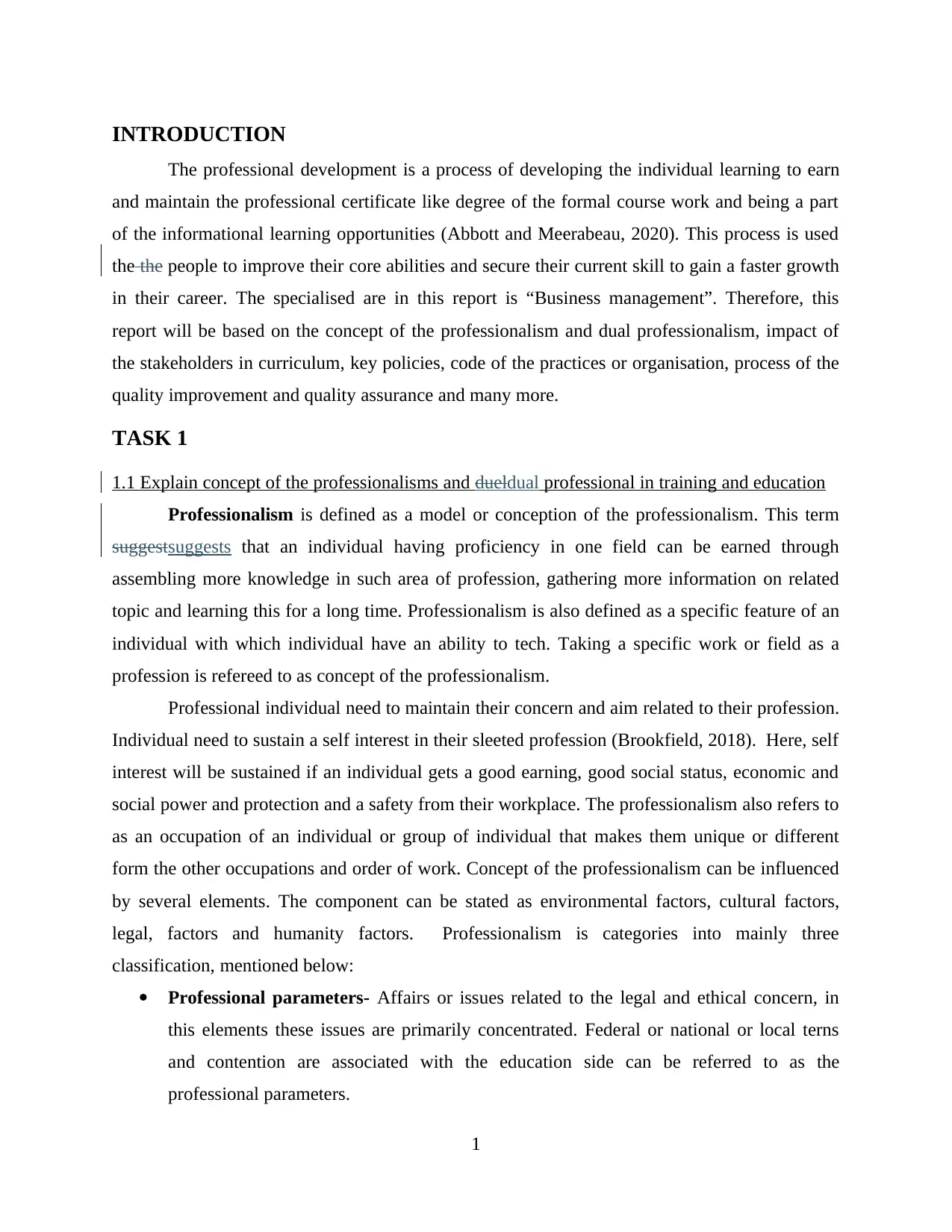
INTRODUCTION
The professional development is a process of developing the individual learning to earn
and maintain the professional certificate like degree of the formal course work and being a part
of the informational learning opportunities (Abbott and Meerabeau, 2020). This process is used
the the people to improve their core abilities and secure their current skill to gain a faster growth
in their career. The specialised are in this report is “Business management”. Therefore, this
report will be based on the concept of the professionalism and dual professionalism, impact of
the stakeholders in curriculum, key policies, code of the practices or organisation, process of the
quality improvement and quality assurance and many more.
TASK 1
1.1 Explain concept of the professionalisms and dueldual professional in training and education
Professionalism is defined as a model or conception of the professionalism. This term
suggestsuggests that an individual having proficiency in one field can be earned through
assembling more knowledge in such area of profession, gathering more information on related
topic and learning this for a long time. Professionalism is also defined as a specific feature of an
individual with which individual have an ability to tech. Taking a specific work or field as a
profession is refereed to as concept of the professionalism.
Professional individual need to maintain their concern and aim related to their profession.
Individual need to sustain a self interest in their sleeted profession (Brookfield, 2018). Here, self
interest will be sustained if an individual gets a good earning, good social status, economic and
social power and protection and a safety from their workplace. The professionalism also refers to
as an occupation of an individual or group of individual that makes them unique or different
form the other occupations and order of work. Concept of the professionalism can be influenced
by several elements. The component can be stated as environmental factors, cultural factors,
legal, factors and humanity factors. Professionalism is categories into mainly three
classification, mentioned below:
Professional parameters- Affairs or issues related to the legal and ethical concern, in
this elements these issues are primarily concentrated. Federal or national or local terns
and contention are associated with the education side can be referred to as the
professional parameters.
1
The professional development is a process of developing the individual learning to earn
and maintain the professional certificate like degree of the formal course work and being a part
of the informational learning opportunities (Abbott and Meerabeau, 2020). This process is used
the the people to improve their core abilities and secure their current skill to gain a faster growth
in their career. The specialised are in this report is “Business management”. Therefore, this
report will be based on the concept of the professionalism and dual professionalism, impact of
the stakeholders in curriculum, key policies, code of the practices or organisation, process of the
quality improvement and quality assurance and many more.
TASK 1
1.1 Explain concept of the professionalisms and dueldual professional in training and education
Professionalism is defined as a model or conception of the professionalism. This term
suggestsuggests that an individual having proficiency in one field can be earned through
assembling more knowledge in such area of profession, gathering more information on related
topic and learning this for a long time. Professionalism is also defined as a specific feature of an
individual with which individual have an ability to tech. Taking a specific work or field as a
profession is refereed to as concept of the professionalism.
Professional individual need to maintain their concern and aim related to their profession.
Individual need to sustain a self interest in their sleeted profession (Brookfield, 2018). Here, self
interest will be sustained if an individual gets a good earning, good social status, economic and
social power and protection and a safety from their workplace. The professionalism also refers to
as an occupation of an individual or group of individual that makes them unique or different
form the other occupations and order of work. Concept of the professionalism can be influenced
by several elements. The component can be stated as environmental factors, cultural factors,
legal, factors and humanity factors. Professionalism is categories into mainly three
classification, mentioned below:
Professional parameters- Affairs or issues related to the legal and ethical concern, in
this elements these issues are primarily concentrated. Federal or national or local terns
and contention are associated with the education side can be referred to as the
professional parameters.
1
Paraphrase This Document
Need a fresh take? Get an instant paraphrase of this document with our AI Paraphraser
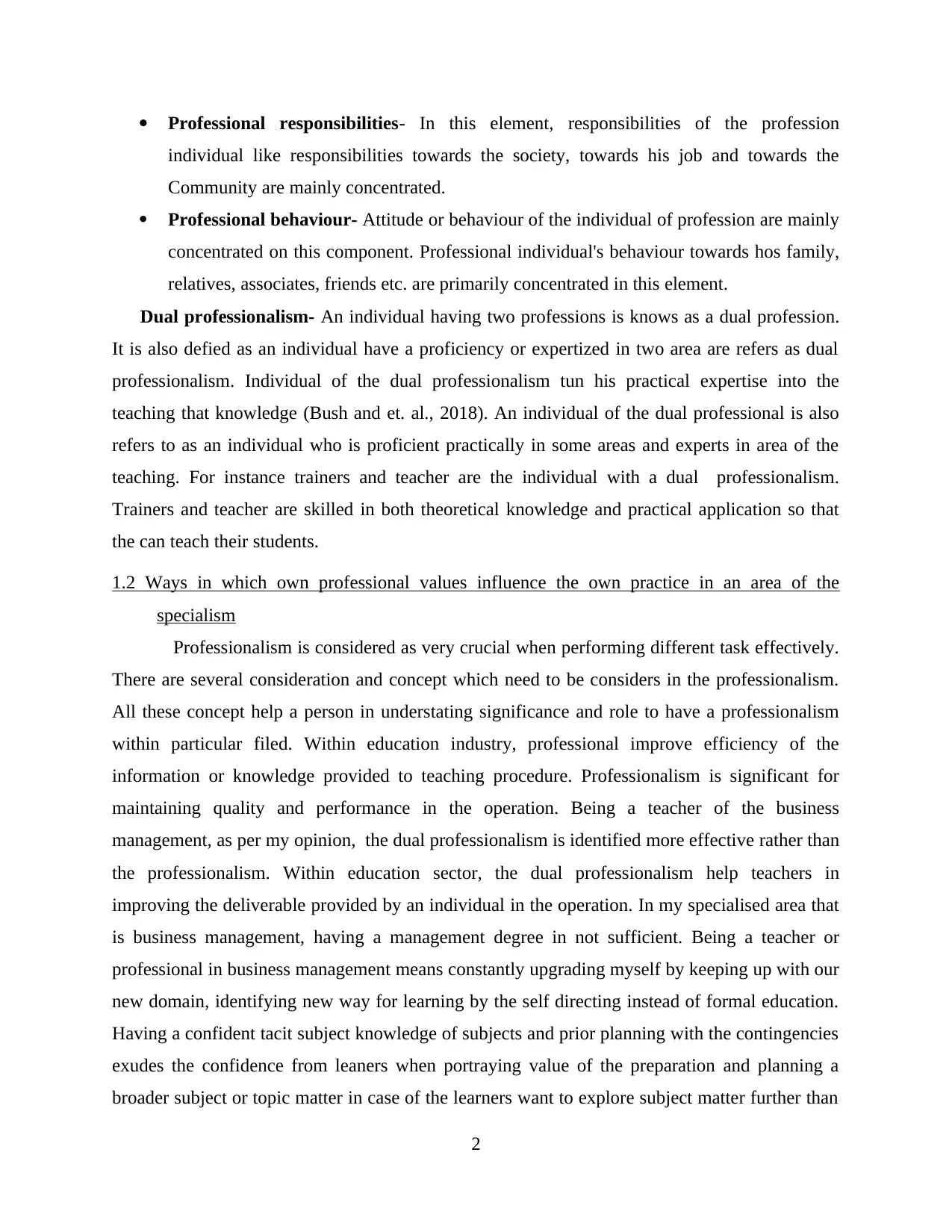
Professional responsibilities- In this element, responsibilities of the profession
individual like responsibilities towards the society, towards his job and towards the
Community are mainly concentrated.
Professional behaviour- Attitude or behaviour of the individual of profession are mainly
concentrated on this component. Professional individual's behaviour towards hos family,
relatives, associates, friends etc. are primarily concentrated in this element.
Dual professionalism- An individual having two professions is knows as a dual profession.
It is also defied as an individual have a proficiency or expertized in two area are refers as dual
professionalism. Individual of the dual professionalism tun his practical expertise into the
teaching that knowledge (Bush and et. al., 2018). An individual of the dual professional is also
refers to as an individual who is proficient practically in some areas and experts in area of the
teaching. For instance trainers and teacher are the individual with a dual professionalism.
Trainers and teacher are skilled in both theoretical knowledge and practical application so that
the can teach their students.
1.2 Ways in which own professional values influence the own practice in an area of the
specialism
Professionalism is considered as very crucial when performing different task effectively.
There are several consideration and concept which need to be considers in the professionalism.
All these concept help a person in understating significance and role to have a professionalism
within particular filed. Within education industry, professional improve efficiency of the
information or knowledge provided to teaching procedure. Professionalism is significant for
maintaining quality and performance in the operation. Being a teacher of the business
management, as per my opinion, the dual professionalism is identified more effective rather than
the professionalism. Within education sector, the dual professionalism help teachers in
improving the deliverable provided by an individual in the operation. In my specialised area that
is business management, having a management degree in not sufficient. Being a teacher or
professional in business management means constantly upgrading myself by keeping up with our
new domain, identifying new way for learning by the self directing instead of formal education.
Having a confident tacit subject knowledge of subjects and prior planning with the contingencies
exudes the confidence from leaners when portraying value of the preparation and planning a
broader subject or topic matter in case of the learners want to explore subject matter further than
2
individual like responsibilities towards the society, towards his job and towards the
Community are mainly concentrated.
Professional behaviour- Attitude or behaviour of the individual of profession are mainly
concentrated on this component. Professional individual's behaviour towards hos family,
relatives, associates, friends etc. are primarily concentrated in this element.
Dual professionalism- An individual having two professions is knows as a dual profession.
It is also defied as an individual have a proficiency or expertized in two area are refers as dual
professionalism. Individual of the dual professionalism tun his practical expertise into the
teaching that knowledge (Bush and et. al., 2018). An individual of the dual professional is also
refers to as an individual who is proficient practically in some areas and experts in area of the
teaching. For instance trainers and teacher are the individual with a dual professionalism.
Trainers and teacher are skilled in both theoretical knowledge and practical application so that
the can teach their students.
1.2 Ways in which own professional values influence the own practice in an area of the
specialism
Professionalism is considered as very crucial when performing different task effectively.
There are several consideration and concept which need to be considers in the professionalism.
All these concept help a person in understating significance and role to have a professionalism
within particular filed. Within education industry, professional improve efficiency of the
information or knowledge provided to teaching procedure. Professionalism is significant for
maintaining quality and performance in the operation. Being a teacher of the business
management, as per my opinion, the dual professionalism is identified more effective rather than
the professionalism. Within education sector, the dual professionalism help teachers in
improving the deliverable provided by an individual in the operation. In my specialised area that
is business management, having a management degree in not sufficient. Being a teacher or
professional in business management means constantly upgrading myself by keeping up with our
new domain, identifying new way for learning by the self directing instead of formal education.
Having a confident tacit subject knowledge of subjects and prior planning with the contingencies
exudes the confidence from leaners when portraying value of the preparation and planning a
broader subject or topic matter in case of the learners want to explore subject matter further than
2
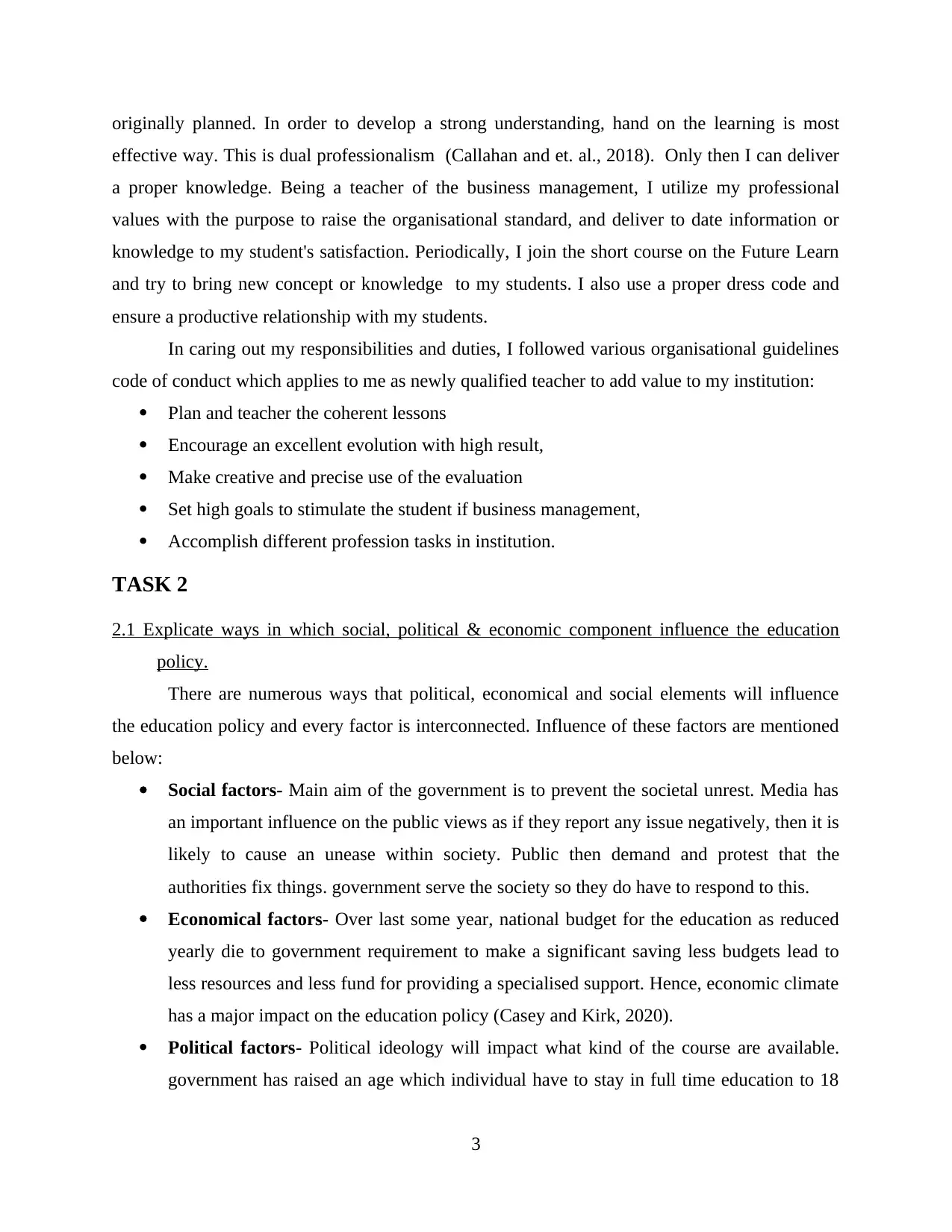
originally planned. In order to develop a strong understanding, hand on the learning is most
effective way. This is dual professionalism (Callahan and et. al., 2018). Only then I can deliver
a proper knowledge. Being a teacher of the business management, I utilize my professional
values with the purpose to raise the organisational standard, and deliver to date information or
knowledge to my student's satisfaction. Periodically, I join the short course on the Future Learn
and try to bring new concept or knowledge to my students. I also use a proper dress code and
ensure a productive relationship with my students.
In caring out my responsibilities and duties, I followed various organisational guidelines
code of conduct which applies to me as newly qualified teacher to add value to my institution:
Plan and teacher the coherent lessons
Encourage an excellent evolution with high result,
Make creative and precise use of the evaluation
Set high goals to stimulate the student if business management,
Accomplish different profession tasks in institution.
TASK 2
2.1 Explicate ways in which social, political & economic component influence the education
policy.
There are numerous ways that political, economical and social elements will influence
the education policy and every factor is interconnected. Influence of these factors are mentioned
below:
Social factors- Main aim of the government is to prevent the societal unrest. Media has
an important influence on the public views as if they report any issue negatively, then it is
likely to cause an unease within society. Public then demand and protest that the
authorities fix things. government serve the society so they do have to respond to this.
Economical factors- Over last some year, national budget for the education as reduced
yearly die to government requirement to make a significant saving less budgets lead to
less resources and less fund for providing a specialised support. Hence, economic climate
has a major impact on the education policy (Casey and Kirk, 2020).
Political factors- Political ideology will impact what kind of the course are available.
government has raised an age which individual have to stay in full time education to 18
3
effective way. This is dual professionalism (Callahan and et. al., 2018). Only then I can deliver
a proper knowledge. Being a teacher of the business management, I utilize my professional
values with the purpose to raise the organisational standard, and deliver to date information or
knowledge to my student's satisfaction. Periodically, I join the short course on the Future Learn
and try to bring new concept or knowledge to my students. I also use a proper dress code and
ensure a productive relationship with my students.
In caring out my responsibilities and duties, I followed various organisational guidelines
code of conduct which applies to me as newly qualified teacher to add value to my institution:
Plan and teacher the coherent lessons
Encourage an excellent evolution with high result,
Make creative and precise use of the evaluation
Set high goals to stimulate the student if business management,
Accomplish different profession tasks in institution.
TASK 2
2.1 Explicate ways in which social, political & economic component influence the education
policy.
There are numerous ways that political, economical and social elements will influence
the education policy and every factor is interconnected. Influence of these factors are mentioned
below:
Social factors- Main aim of the government is to prevent the societal unrest. Media has
an important influence on the public views as if they report any issue negatively, then it is
likely to cause an unease within society. Public then demand and protest that the
authorities fix things. government serve the society so they do have to respond to this.
Economical factors- Over last some year, national budget for the education as reduced
yearly die to government requirement to make a significant saving less budgets lead to
less resources and less fund for providing a specialised support. Hence, economic climate
has a major impact on the education policy (Casey and Kirk, 2020).
Political factors- Political ideology will impact what kind of the course are available.
government has raised an age which individual have to stay in full time education to 18
3
⊘ This is a preview!⊘
Do you want full access?
Subscribe today to unlock all pages.

Trusted by 1+ million students worldwide
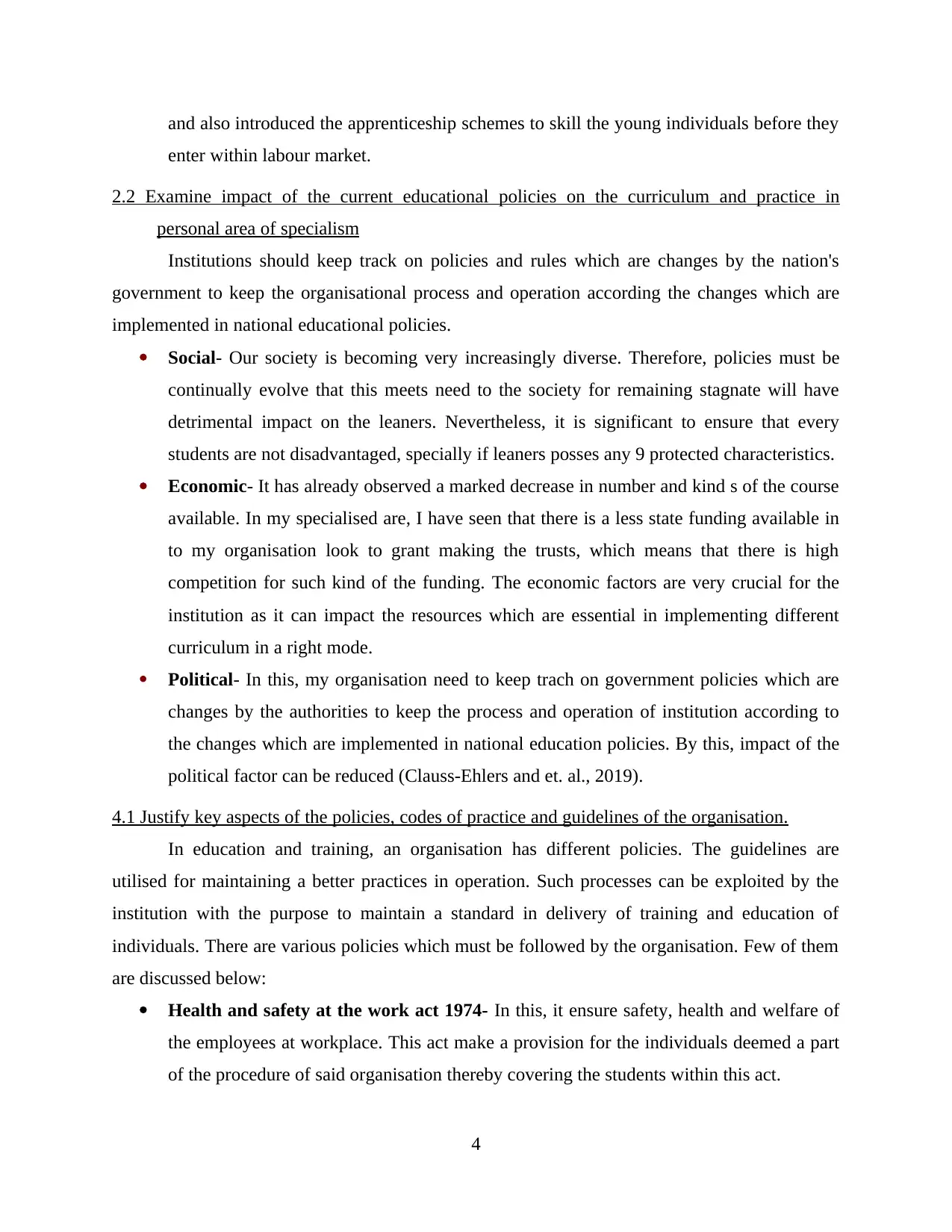
and also introduced the apprenticeship schemes to skill the young individuals before they
enter within labour market.
2.2 Examine impact of the current educational policies on the curriculum and practice in
personal area of specialism
Institutions should keep track on policies and rules which are changes by the nation's
government to keep the organisational process and operation according the changes which are
implemented in national educational policies.
Social- Our society is becoming very increasingly diverse. Therefore, policies must be
continually evolve that this meets need to the society for remaining stagnate will have
detrimental impact on the leaners. Nevertheless, it is significant to ensure that every
students are not disadvantaged, specially if leaners posses any 9 protected characteristics.
Economic- It has already observed a marked decrease in number and kind s of the course
available. In my specialised are, I have seen that there is a less state funding available in
to my organisation look to grant making the trusts, which means that there is high
competition for such kind of the funding. The economic factors are very crucial for the
institution as it can impact the resources which are essential in implementing different
curriculum in a right mode.
Political- In this, my organisation need to keep trach on government policies which are
changes by the authorities to keep the process and operation of institution according to
the changes which are implemented in national education policies. By this, impact of the
political factor can be reduced (Clauss-Ehlers and et. al., 2019).
4.1 Justify key aspects of the policies, codes of practice and guidelines of the organisation.
In education and training, an organisation has different policies. The guidelines are
utilised for maintaining a better practices in operation. Such processes can be exploited by the
institution with the purpose to maintain a standard in delivery of training and education of
individuals. There are various policies which must be followed by the organisation. Few of them
are discussed below:
Health and safety at the work act 1974- In this, it ensure safety, health and welfare of
the employees at workplace. This act make a provision for the individuals deemed a part
of the procedure of said organisation thereby covering the students within this act.
4
enter within labour market.
2.2 Examine impact of the current educational policies on the curriculum and practice in
personal area of specialism
Institutions should keep track on policies and rules which are changes by the nation's
government to keep the organisational process and operation according the changes which are
implemented in national educational policies.
Social- Our society is becoming very increasingly diverse. Therefore, policies must be
continually evolve that this meets need to the society for remaining stagnate will have
detrimental impact on the leaners. Nevertheless, it is significant to ensure that every
students are not disadvantaged, specially if leaners posses any 9 protected characteristics.
Economic- It has already observed a marked decrease in number and kind s of the course
available. In my specialised are, I have seen that there is a less state funding available in
to my organisation look to grant making the trusts, which means that there is high
competition for such kind of the funding. The economic factors are very crucial for the
institution as it can impact the resources which are essential in implementing different
curriculum in a right mode.
Political- In this, my organisation need to keep trach on government policies which are
changes by the authorities to keep the process and operation of institution according to
the changes which are implemented in national education policies. By this, impact of the
political factor can be reduced (Clauss-Ehlers and et. al., 2019).
4.1 Justify key aspects of the policies, codes of practice and guidelines of the organisation.
In education and training, an organisation has different policies. The guidelines are
utilised for maintaining a better practices in operation. Such processes can be exploited by the
institution with the purpose to maintain a standard in delivery of training and education of
individuals. There are various policies which must be followed by the organisation. Few of them
are discussed below:
Health and safety at the work act 1974- In this, it ensure safety, health and welfare of
the employees at workplace. This act make a provision for the individuals deemed a part
of the procedure of said organisation thereby covering the students within this act.
4
Paraphrase This Document
Need a fresh take? Get an instant paraphrase of this document with our AI Paraphraser
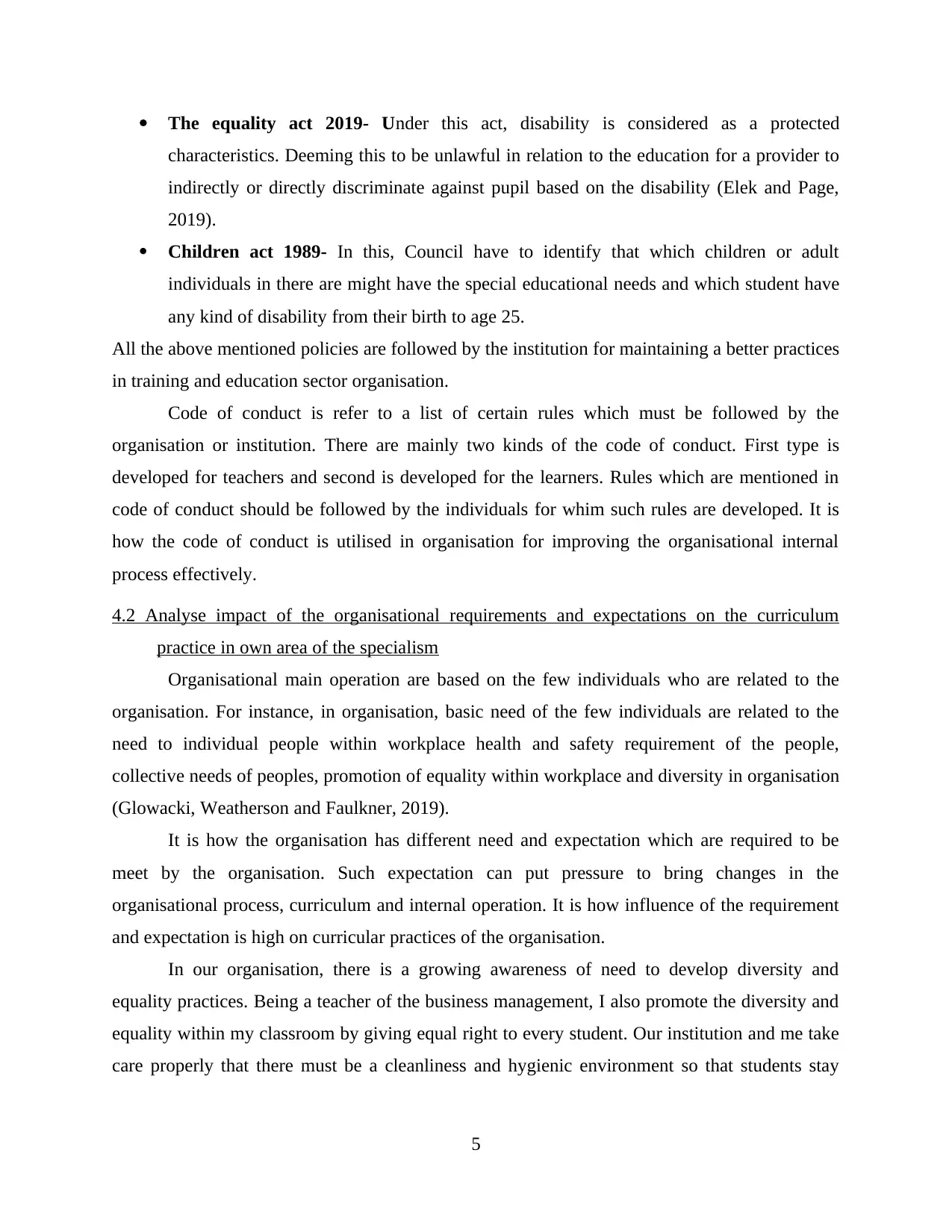
The equality act 2019- Under this act, disability is considered as a protected
characteristics. Deeming this to be unlawful in relation to the education for a provider to
indirectly or directly discriminate against pupil based on the disability (Elek and Page,
2019).
Children act 1989- In this, Council have to identify that which children or adult
individuals in there are might have the special educational needs and which student have
any kind of disability from their birth to age 25.
All the above mentioned policies are followed by the institution for maintaining a better practices
in training and education sector organisation.
Code of conduct is refer to a list of certain rules which must be followed by the
organisation or institution. There are mainly two kinds of the code of conduct. First type is
developed for teachers and second is developed for the learners. Rules which are mentioned in
code of conduct should be followed by the individuals for whim such rules are developed. It is
how the code of conduct is utilised in organisation for improving the organisational internal
process effectively.
4.2 Analyse impact of the organisational requirements and expectations on the curriculum
practice in own area of the specialism
Organisational main operation are based on the few individuals who are related to the
organisation. For instance, in organisation, basic need of the few individuals are related to the
need to individual people within workplace health and safety requirement of the people,
collective needs of peoples, promotion of equality within workplace and diversity in organisation
(Glowacki, Weatherson and Faulkner, 2019).
It is how the organisation has different need and expectation which are required to be
meet by the organisation. Such expectation can put pressure to bring changes in the
organisational process, curriculum and internal operation. It is how influence of the requirement
and expectation is high on curricular practices of the organisation.
In our organisation, there is a growing awareness of need to develop diversity and
equality practices. Being a teacher of the business management, I also promote the diversity and
equality within my classroom by giving equal right to every student. Our institution and me take
care properly that there must be a cleanliness and hygienic environment so that students stay
5
characteristics. Deeming this to be unlawful in relation to the education for a provider to
indirectly or directly discriminate against pupil based on the disability (Elek and Page,
2019).
Children act 1989- In this, Council have to identify that which children or adult
individuals in there are might have the special educational needs and which student have
any kind of disability from their birth to age 25.
All the above mentioned policies are followed by the institution for maintaining a better practices
in training and education sector organisation.
Code of conduct is refer to a list of certain rules which must be followed by the
organisation or institution. There are mainly two kinds of the code of conduct. First type is
developed for teachers and second is developed for the learners. Rules which are mentioned in
code of conduct should be followed by the individuals for whim such rules are developed. It is
how the code of conduct is utilised in organisation for improving the organisational internal
process effectively.
4.2 Analyse impact of the organisational requirements and expectations on the curriculum
practice in own area of the specialism
Organisational main operation are based on the few individuals who are related to the
organisation. For instance, in organisation, basic need of the few individuals are related to the
need to individual people within workplace health and safety requirement of the people,
collective needs of peoples, promotion of equality within workplace and diversity in organisation
(Glowacki, Weatherson and Faulkner, 2019).
It is how the organisation has different need and expectation which are required to be
meet by the organisation. Such expectation can put pressure to bring changes in the
organisational process, curriculum and internal operation. It is how influence of the requirement
and expectation is high on curricular practices of the organisation.
In our organisation, there is a growing awareness of need to develop diversity and
equality practices. Being a teacher of the business management, I also promote the diversity and
equality within my classroom by giving equal right to every student. Our institution and me take
care properly that there must be a cleanliness and hygienic environment so that students stay
5
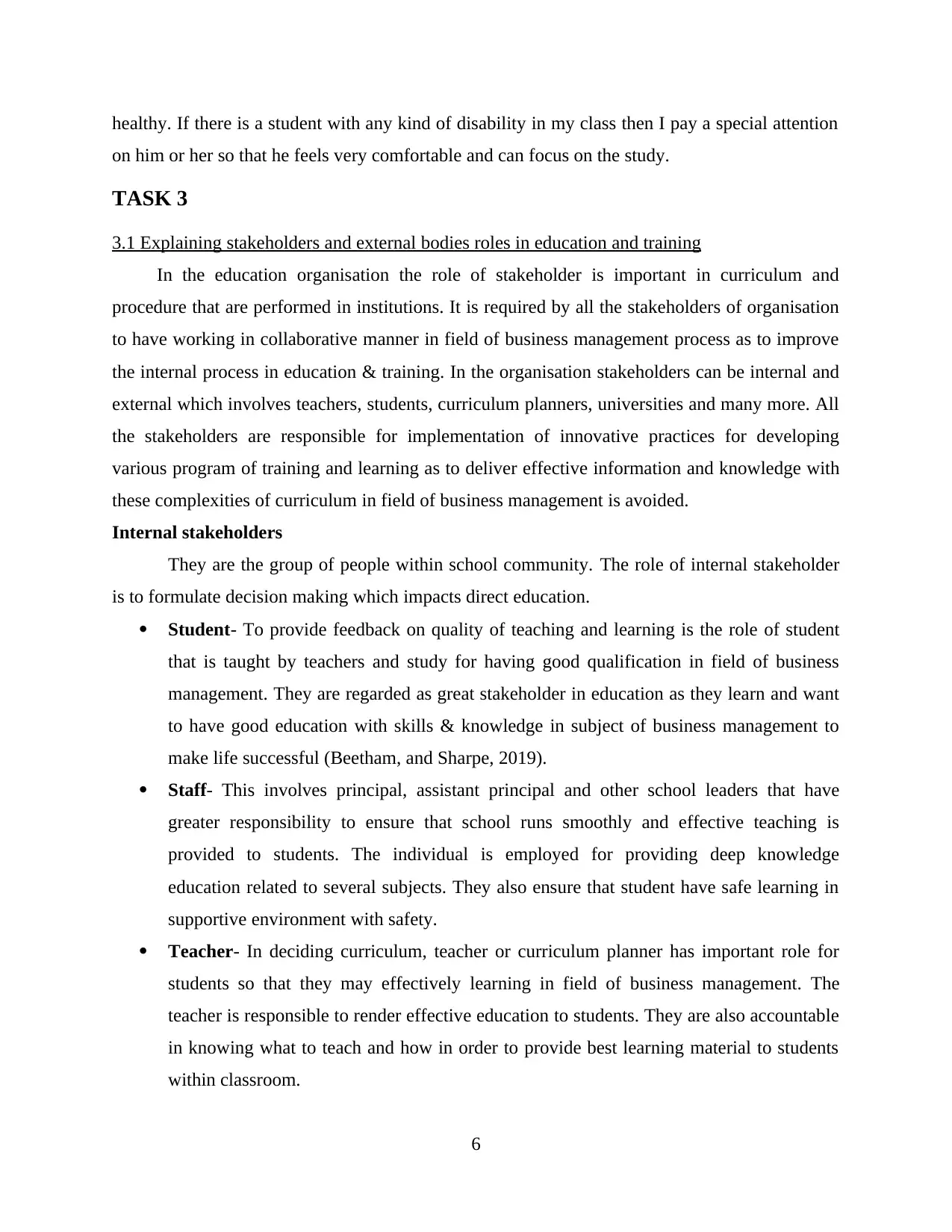
healthy. If there is a student with any kind of disability in my class then I pay a special attention
on him or her so that he feels very comfortable and can focus on the study.
TASK 3
3.1 Explaining stakeholders and external bodies roles in education and training
In the education organisation the role of stakeholder is important in curriculum and
procedure that are performed in institutions. It is required by all the stakeholders of organisation
to have working in collaborative manner in field of business management process as to improve
the internal process in education & training. In the organisation stakeholders can be internal and
external which involves teachers, students, curriculum planners, universities and many more. All
the stakeholders are responsible for implementation of innovative practices for developing
various program of training and learning as to deliver effective information and knowledge with
these complexities of curriculum in field of business management is avoided.
Internal stakeholders
They are the group of people within school community. The role of internal stakeholder
is to formulate decision making which impacts direct education.
Student- To provide feedback on quality of teaching and learning is the role of student
that is taught by teachers and study for having good qualification in field of business
management. They are regarded as great stakeholder in education as they learn and want
to have good education with skills & knowledge in subject of business management to
make life successful (Beetham, and Sharpe, 2019).
Staff- This involves principal, assistant principal and other school leaders that have
greater responsibility to ensure that school runs smoothly and effective teaching is
provided to students. The individual is employed for providing deep knowledge
education related to several subjects. They also ensure that student have safe learning in
supportive environment with safety.
Teacher- In deciding curriculum, teacher or curriculum planner has important role for
students so that they may effectively learning in field of business management. The
teacher is responsible to render effective education to students. They are also accountable
in knowing what to teach and how in order to provide best learning material to students
within classroom.
6
on him or her so that he feels very comfortable and can focus on the study.
TASK 3
3.1 Explaining stakeholders and external bodies roles in education and training
In the education organisation the role of stakeholder is important in curriculum and
procedure that are performed in institutions. It is required by all the stakeholders of organisation
to have working in collaborative manner in field of business management process as to improve
the internal process in education & training. In the organisation stakeholders can be internal and
external which involves teachers, students, curriculum planners, universities and many more. All
the stakeholders are responsible for implementation of innovative practices for developing
various program of training and learning as to deliver effective information and knowledge with
these complexities of curriculum in field of business management is avoided.
Internal stakeholders
They are the group of people within school community. The role of internal stakeholder
is to formulate decision making which impacts direct education.
Student- To provide feedback on quality of teaching and learning is the role of student
that is taught by teachers and study for having good qualification in field of business
management. They are regarded as great stakeholder in education as they learn and want
to have good education with skills & knowledge in subject of business management to
make life successful (Beetham, and Sharpe, 2019).
Staff- This involves principal, assistant principal and other school leaders that have
greater responsibility to ensure that school runs smoothly and effective teaching is
provided to students. The individual is employed for providing deep knowledge
education related to several subjects. They also ensure that student have safe learning in
supportive environment with safety.
Teacher- In deciding curriculum, teacher or curriculum planner has important role for
students so that they may effectively learning in field of business management. The
teacher is responsible to render effective education to students. They are also accountable
in knowing what to teach and how in order to provide best learning material to students
within classroom.
6
⊘ This is a preview!⊘
Do you want full access?
Subscribe today to unlock all pages.

Trusted by 1+ million students worldwide
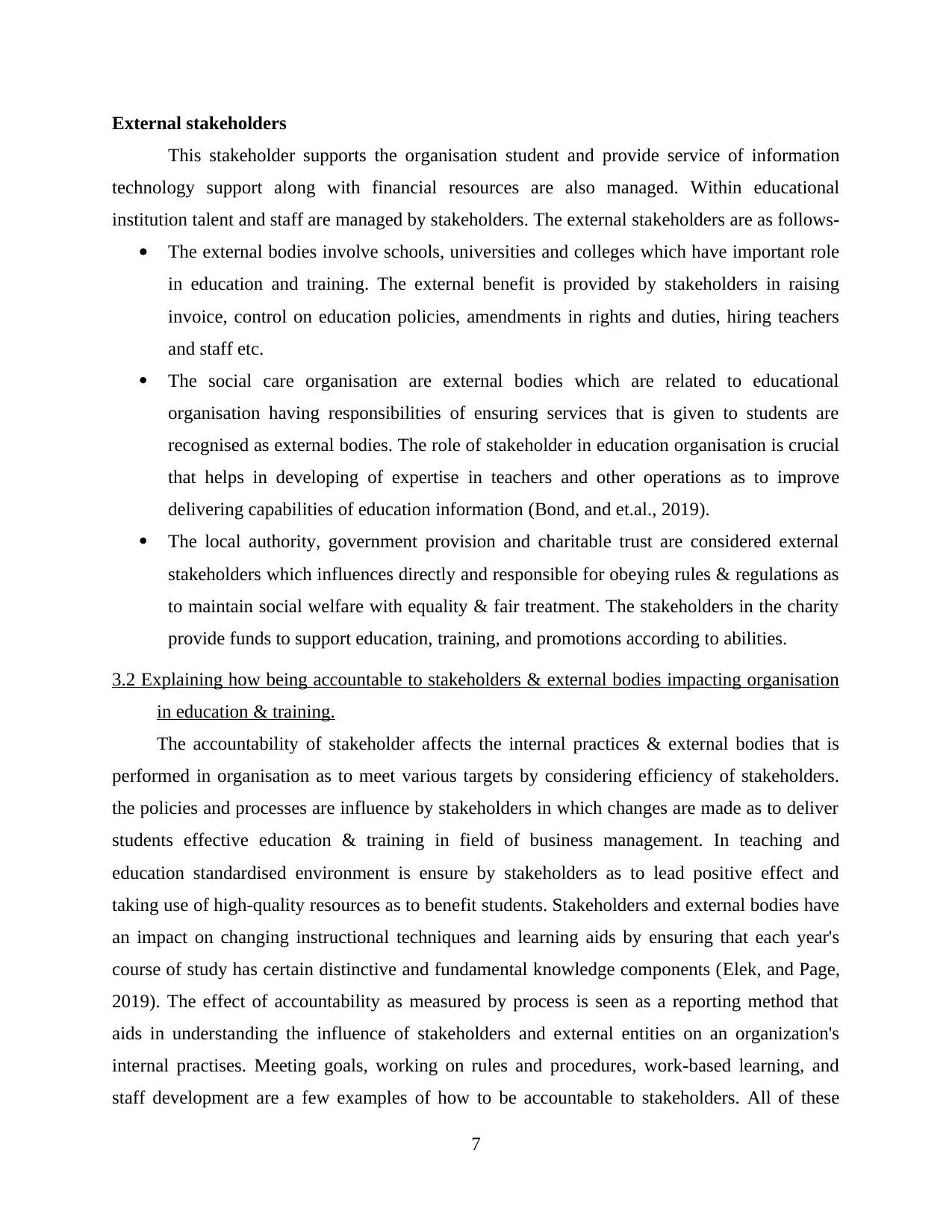
External stakeholders
This stakeholder supports the organisation student and provide service of information
technology support along with financial resources are also managed. Within educational
institution talent and staff are managed by stakeholders. The external stakeholders are as follows-
The external bodies involve schools, universities and colleges which have important role
in education and training. The external benefit is provided by stakeholders in raising
invoice, control on education policies, amendments in rights and duties, hiring teachers
and staff etc.
The social care organisation are external bodies which are related to educational
organisation having responsibilities of ensuring services that is given to students are
recognised as external bodies. The role of stakeholder in education organisation is crucial
that helps in developing of expertise in teachers and other operations as to improve
delivering capabilities of education information (Bond, and et.al., 2019).
The local authority, government provision and charitable trust are considered external
stakeholders which influences directly and responsible for obeying rules & regulations as
to maintain social welfare with equality & fair treatment. The stakeholders in the charity
provide funds to support education, training, and promotions according to abilities.
3.2 Explaining how being accountable to stakeholders & external bodies impacting organisation
in education & training.
The accountability of stakeholder affects the internal practices & external bodies that is
performed in organisation as to meet various targets by considering efficiency of stakeholders.
the policies and processes are influence by stakeholders in which changes are made as to deliver
students effective education & training in field of business management. In teaching and
education standardised environment is ensure by stakeholders as to lead positive effect and
taking use of high-quality resources as to benefit students. Stakeholders and external bodies have
an impact on changing instructional techniques and learning aids by ensuring that each year's
course of study has certain distinctive and fundamental knowledge components (Elek, and Page,
2019). The effect of accountability as measured by process is seen as a reporting method that
aids in understanding the influence of stakeholders and external entities on an organization's
internal practises. Meeting goals, working on rules and procedures, work-based learning, and
staff development are a few examples of how to be accountable to stakeholders. All of these
7
This stakeholder supports the organisation student and provide service of information
technology support along with financial resources are also managed. Within educational
institution talent and staff are managed by stakeholders. The external stakeholders are as follows-
The external bodies involve schools, universities and colleges which have important role
in education and training. The external benefit is provided by stakeholders in raising
invoice, control on education policies, amendments in rights and duties, hiring teachers
and staff etc.
The social care organisation are external bodies which are related to educational
organisation having responsibilities of ensuring services that is given to students are
recognised as external bodies. The role of stakeholder in education organisation is crucial
that helps in developing of expertise in teachers and other operations as to improve
delivering capabilities of education information (Bond, and et.al., 2019).
The local authority, government provision and charitable trust are considered external
stakeholders which influences directly and responsible for obeying rules & regulations as
to maintain social welfare with equality & fair treatment. The stakeholders in the charity
provide funds to support education, training, and promotions according to abilities.
3.2 Explaining how being accountable to stakeholders & external bodies impacting organisation
in education & training.
The accountability of stakeholder affects the internal practices & external bodies that is
performed in organisation as to meet various targets by considering efficiency of stakeholders.
the policies and processes are influence by stakeholders in which changes are made as to deliver
students effective education & training in field of business management. In teaching and
education standardised environment is ensure by stakeholders as to lead positive effect and
taking use of high-quality resources as to benefit students. Stakeholders and external bodies have
an impact on changing instructional techniques and learning aids by ensuring that each year's
course of study has certain distinctive and fundamental knowledge components (Elek, and Page,
2019). The effect of accountability as measured by process is seen as a reporting method that
aids in understanding the influence of stakeholders and external entities on an organization's
internal practises. Meeting goals, working on rules and procedures, work-based learning, and
staff development are a few examples of how to be accountable to stakeholders. All of these
7
Paraphrase This Document
Need a fresh take? Get an instant paraphrase of this document with our AI Paraphraser
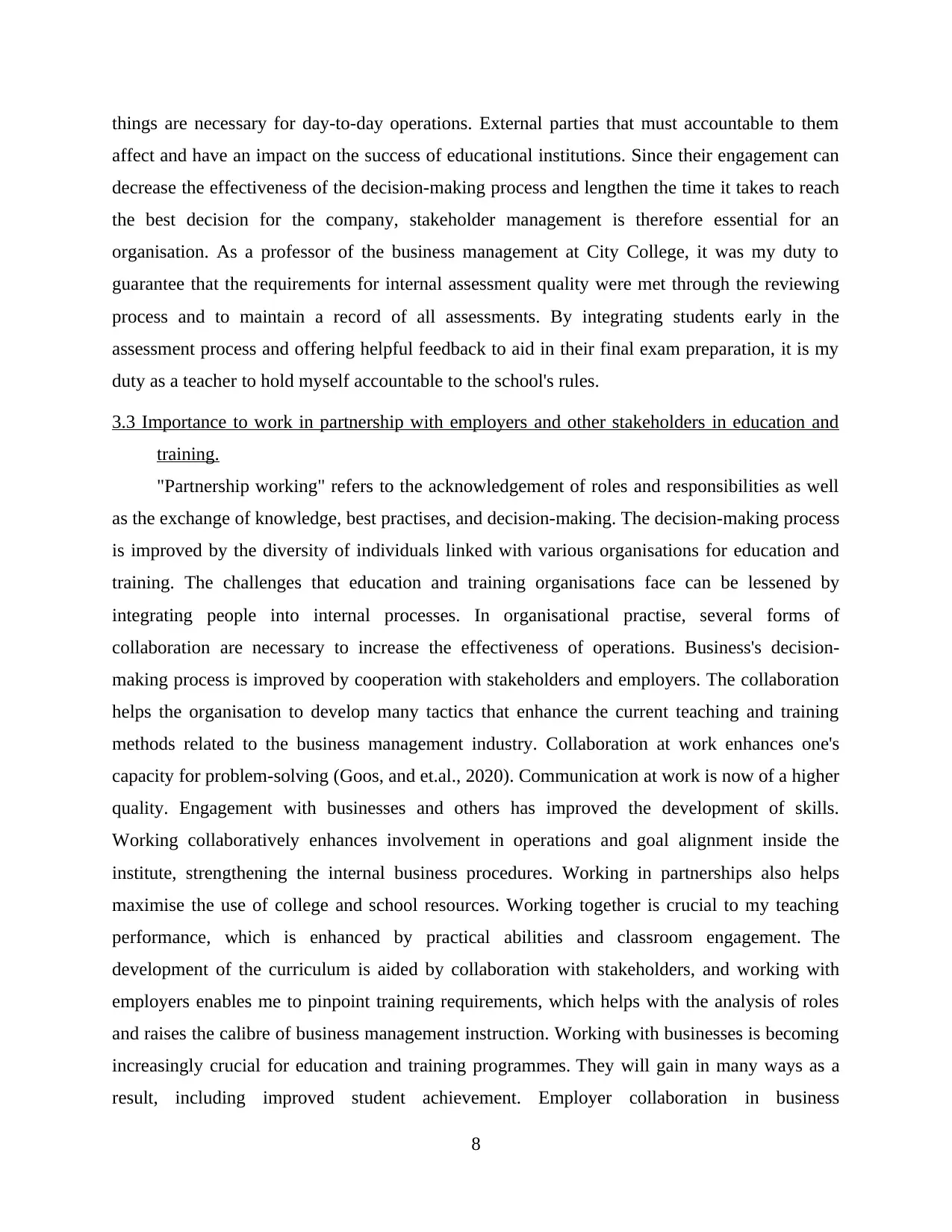
things are necessary for day-to-day operations. External parties that must accountable to them
affect and have an impact on the success of educational institutions. Since their engagement can
decrease the effectiveness of the decision-making process and lengthen the time it takes to reach
the best decision for the company, stakeholder management is therefore essential for an
organisation. As a professor of the business management at City College, it was my duty to
guarantee that the requirements for internal assessment quality were met through the reviewing
process and to maintain a record of all assessments. By integrating students early in the
assessment process and offering helpful feedback to aid in their final exam preparation, it is my
duty as a teacher to hold myself accountable to the school's rules.
3.3 Importance to work in partnership with employers and other stakeholders in education and
training.
"Partnership working" refers to the acknowledgement of roles and responsibilities as well
as the exchange of knowledge, best practises, and decision-making. The decision-making process
is improved by the diversity of individuals linked with various organisations for education and
training. The challenges that education and training organisations face can be lessened by
integrating people into internal processes. In organisational practise, several forms of
collaboration are necessary to increase the effectiveness of operations. Business's decision-
making process is improved by cooperation with stakeholders and employers. The collaboration
helps the organisation to develop many tactics that enhance the current teaching and training
methods related to the business management industry. Collaboration at work enhances one's
capacity for problem-solving (Goos, and et.al., 2020). Communication at work is now of a higher
quality. Engagement with businesses and others has improved the development of skills.
Working collaboratively enhances involvement in operations and goal alignment inside the
institute, strengthening the internal business procedures. Working in partnerships also helps
maximise the use of college and school resources. Working together is crucial to my teaching
performance, which is enhanced by practical abilities and classroom engagement. The
development of the curriculum is aided by collaboration with stakeholders, and working with
employers enables me to pinpoint training requirements, which helps with the analysis of roles
and raises the calibre of business management instruction. Working with businesses is becoming
increasingly crucial for education and training programmes. They will gain in many ways as a
result, including improved student achievement. Employer collaboration in business
8
affect and have an impact on the success of educational institutions. Since their engagement can
decrease the effectiveness of the decision-making process and lengthen the time it takes to reach
the best decision for the company, stakeholder management is therefore essential for an
organisation. As a professor of the business management at City College, it was my duty to
guarantee that the requirements for internal assessment quality were met through the reviewing
process and to maintain a record of all assessments. By integrating students early in the
assessment process and offering helpful feedback to aid in their final exam preparation, it is my
duty as a teacher to hold myself accountable to the school's rules.
3.3 Importance to work in partnership with employers and other stakeholders in education and
training.
"Partnership working" refers to the acknowledgement of roles and responsibilities as well
as the exchange of knowledge, best practises, and decision-making. The decision-making process
is improved by the diversity of individuals linked with various organisations for education and
training. The challenges that education and training organisations face can be lessened by
integrating people into internal processes. In organisational practise, several forms of
collaboration are necessary to increase the effectiveness of operations. Business's decision-
making process is improved by cooperation with stakeholders and employers. The collaboration
helps the organisation to develop many tactics that enhance the current teaching and training
methods related to the business management industry. Collaboration at work enhances one's
capacity for problem-solving (Goos, and et.al., 2020). Communication at work is now of a higher
quality. Engagement with businesses and others has improved the development of skills.
Working collaboratively enhances involvement in operations and goal alignment inside the
institute, strengthening the internal business procedures. Working in partnerships also helps
maximise the use of college and school resources. Working together is crucial to my teaching
performance, which is enhanced by practical abilities and classroom engagement. The
development of the curriculum is aided by collaboration with stakeholders, and working with
employers enables me to pinpoint training requirements, which helps with the analysis of roles
and raises the calibre of business management instruction. Working with businesses is becoming
increasingly crucial for education and training programmes. They will gain in many ways as a
result, including improved student achievement. Employer collaboration in business
8
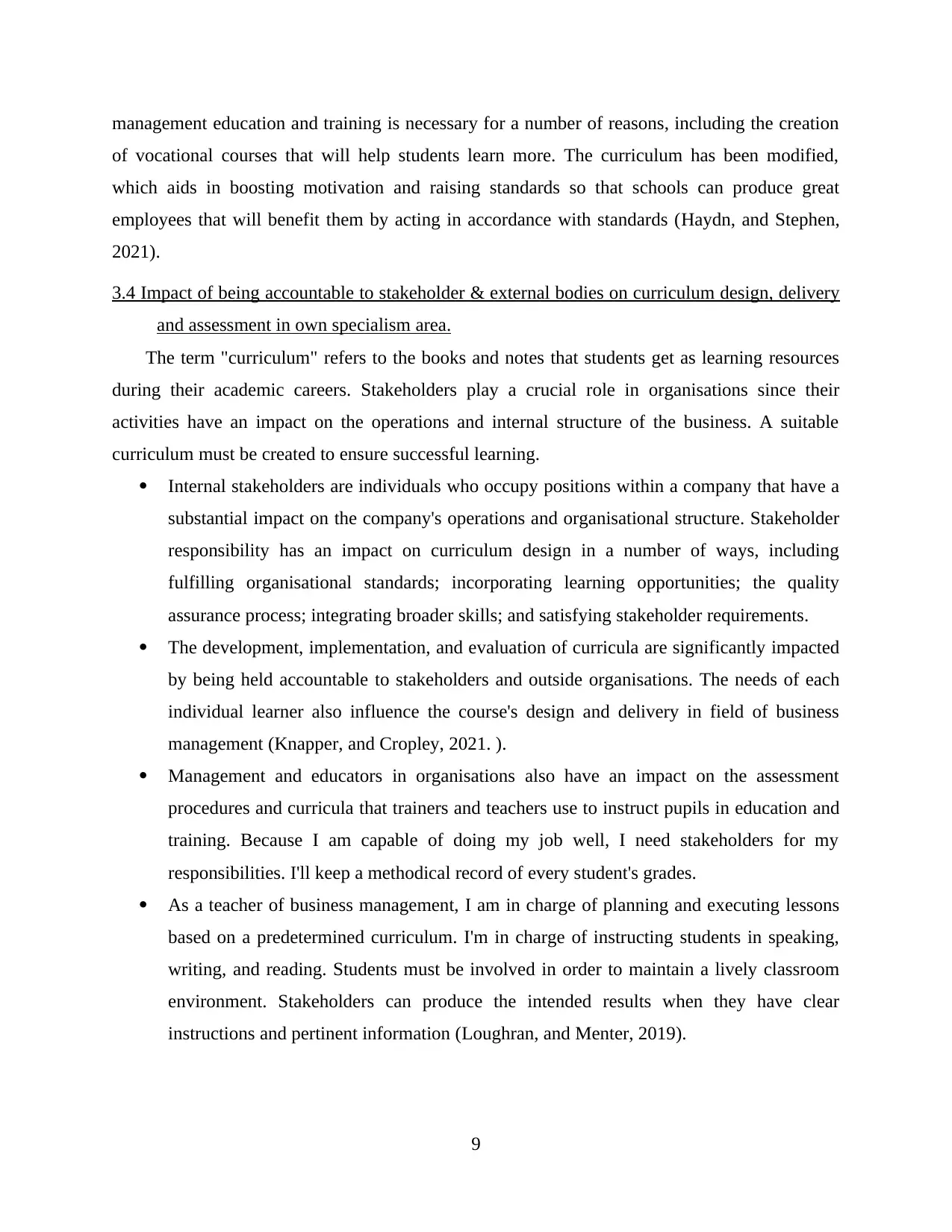
management education and training is necessary for a number of reasons, including the creation
of vocational courses that will help students learn more. The curriculum has been modified,
which aids in boosting motivation and raising standards so that schools can produce great
employees that will benefit them by acting in accordance with standards (Haydn, and Stephen,
2021).
3.4 Impact of being accountable to stakeholder & external bodies on curriculum design, delivery
and assessment in own specialism area.
The term "curriculum" refers to the books and notes that students get as learning resources
during their academic careers. Stakeholders play a crucial role in organisations since their
activities have an impact on the operations and internal structure of the business. A suitable
curriculum must be created to ensure successful learning.
Internal stakeholders are individuals who occupy positions within a company that have a
substantial impact on the company's operations and organisational structure. Stakeholder
responsibility has an impact on curriculum design in a number of ways, including
fulfilling organisational standards; incorporating learning opportunities; the quality
assurance process; integrating broader skills; and satisfying stakeholder requirements.
The development, implementation, and evaluation of curricula are significantly impacted
by being held accountable to stakeholders and outside organisations. The needs of each
individual learner also influence the course's design and delivery in field of business
management (Knapper, and Cropley, 2021. ).
Management and educators in organisations also have an impact on the assessment
procedures and curricula that trainers and teachers use to instruct pupils in education and
training. Because I am capable of doing my job well, I need stakeholders for my
responsibilities. I'll keep a methodical record of every student's grades.
As a teacher of business management, I am in charge of planning and executing lessons
based on a predetermined curriculum. I'm in charge of instructing students in speaking,
writing, and reading. Students must be involved in order to maintain a lively classroom
environment. Stakeholders can produce the intended results when they have clear
instructions and pertinent information (Loughran, and Menter, 2019).
9
of vocational courses that will help students learn more. The curriculum has been modified,
which aids in boosting motivation and raising standards so that schools can produce great
employees that will benefit them by acting in accordance with standards (Haydn, and Stephen,
2021).
3.4 Impact of being accountable to stakeholder & external bodies on curriculum design, delivery
and assessment in own specialism area.
The term "curriculum" refers to the books and notes that students get as learning resources
during their academic careers. Stakeholders play a crucial role in organisations since their
activities have an impact on the operations and internal structure of the business. A suitable
curriculum must be created to ensure successful learning.
Internal stakeholders are individuals who occupy positions within a company that have a
substantial impact on the company's operations and organisational structure. Stakeholder
responsibility has an impact on curriculum design in a number of ways, including
fulfilling organisational standards; incorporating learning opportunities; the quality
assurance process; integrating broader skills; and satisfying stakeholder requirements.
The development, implementation, and evaluation of curricula are significantly impacted
by being held accountable to stakeholders and outside organisations. The needs of each
individual learner also influence the course's design and delivery in field of business
management (Knapper, and Cropley, 2021. ).
Management and educators in organisations also have an impact on the assessment
procedures and curricula that trainers and teachers use to instruct pupils in education and
training. Because I am capable of doing my job well, I need stakeholders for my
responsibilities. I'll keep a methodical record of every student's grades.
As a teacher of business management, I am in charge of planning and executing lessons
based on a predetermined curriculum. I'm in charge of instructing students in speaking,
writing, and reading. Students must be involved in order to maintain a lively classroom
environment. Stakeholders can produce the intended results when they have clear
instructions and pertinent information (Loughran, and Menter, 2019).
9
⊘ This is a preview!⊘
Do you want full access?
Subscribe today to unlock all pages.

Trusted by 1+ million students worldwide
1 out of 17
Related Documents
Your All-in-One AI-Powered Toolkit for Academic Success.
+13062052269
info@desklib.com
Available 24*7 on WhatsApp / Email
![[object Object]](/_next/static/media/star-bottom.7253800d.svg)
Unlock your academic potential
Copyright © 2020–2025 A2Z Services. All Rights Reserved. Developed and managed by ZUCOL.

